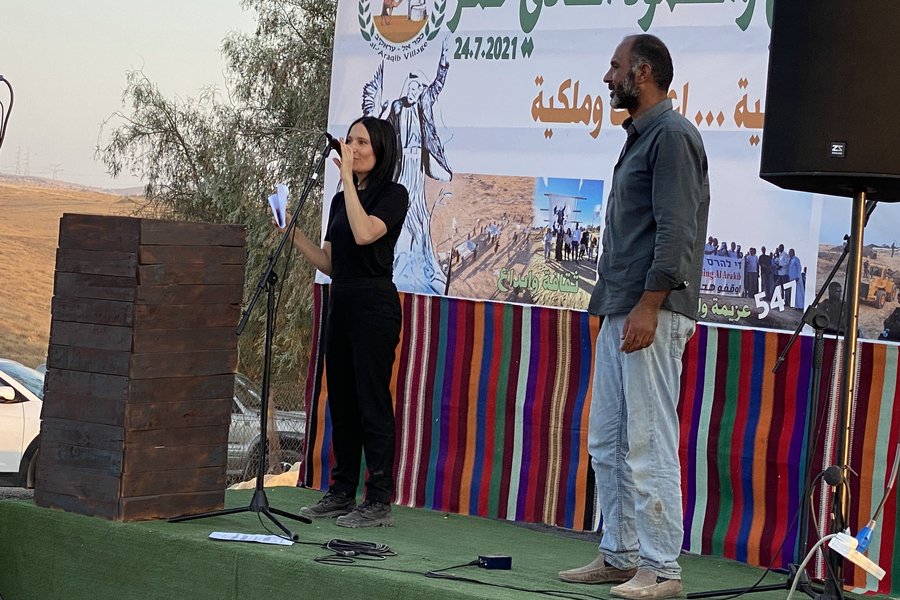Al Araqib residents embroider dreams of a better future
At an event marking the 11th anniversary since the village’s first demolition, SFP graduates employ art in joining the residents’ struggle to rebuild their homes and hold on to their land.
“My dream is that the houses in Al-Araqib will return”, said one participant. Hundreds of people took part on Saturday in opening an art exhibition in the unrecognized village of Al-Araqib in the Negev, marking 11 years since the first demolition of the village. The exhibition includes embroidery works that present stories of the village men and women. In addition, video and drama works were presented that are based on the court records from the trial of the village leader, Sheikh Sayeh Abu- Mdeighim al Turi.
On July 27, 2010, hundreds of police officers raided the village, which was then inhabited by about 500 people, and demolished all the buildings in it. Since then, the village has been destroyed 189 more times, but after each demolition, the residents have re-established their residential shelters. Till today, several dozen residents remain, forced to live in the cemetery.
Despite the recurring demolitions, Sheikh Sayyah and his family remain in the village and have never left. As in 37 other unrecognized villages in the Negev, the residents of al-Araqib are not connected to infrastructure such as water, sewage and electricity, and in order to receive education or medical services, they must travel to Rahat.
According to residents (see the Hebrew language report of Oren Ziv in Local Call from 26 July, 2021), during the last year and a half, the residents have experienced an increase in action taken against them, which has included more frequent demolitions, raids on the village, arrests, confiscation of equipment and investigations.
The opening of a center adjoining Al Araqib is a joint initiative by the villagers and a group of artists facilitated by actress and director Einat Weizmann. Weizmann is also the artistic facilitator of the change agents course for creators in the performing arts and cinema, which the SFP conducted in 2020-21. She herself attended an earlier SFP change agents course in 2010. Weizmann recruited some of the course participants to take part of the opening of the center and to be active in the village.
Adam Uriel, a graduate of the course initiated one project comprising embroidery works created jointly by women of the village and activists in Tel Aviv. Their creations depict the dreams and memories of the residents of the village: memories of the days before the demolition and dreams of future days of peace and security in the village.
Actress and director Riki Hayut, a graduate of the course, presented a short theatrical piece with Qayed Abu Latif from Yosef Weitz’s Diaries on the discussion between him and Ben-Gurion on the future of the lands in the Negev, with extracts of court records from Sheikh Sayyah’s trial.
Vardit Goldner, another graduate, created a video called “Swimming Lesson” in which she teaches the girls of the village to swim. On land.
Bassal Tannous, a graduate of the course, produced the event, managing to produce a high level event in the impossible conditions of a village that is not connected to infrastructure or electricity.
Einat Weizman was the initiator and facilitator of the art performances.
The special solidarity event was attended by hundreds of Bedouin Palestinians living in the Negev and by about 700 Israeli activists and artists.
It is gratifying that our graduates have enlisted in this struggle with the tools of critical art.

